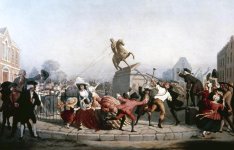Today is probably an appropriate day to post this. The first letter below was written to Eisenhower in 1960 by a dentist, Leon Scott. Eisenhower's reply follows. The bold emphasis in Eisenhower's letter is mine, as it's important to note that at the time of the Civil War the Constitution was silent on secession.
***********************
August 1, 1960
Mr. Dwight D. Eisenhower
White House
Washington, D.C.
Dear Mr. President:
At the Republication Convention I heard you mention that you have the pictures of four (4) great Americans in your office, and that included in these is a picture of Robert E. Lee.
I do not understand how any American can include Robert E. Lee as a person to be emulated, and why the President of the United States of America should do so is certainly beyond me.
The most outstanding thing that Robert E. Lee did, was to devote his best efforts to the destruction of the United States Government, and I am sure that you do not say that a person who tries to destroy our Government is worthy of being held as one of our heroes.
Will you please tell me just why you hold him in such high esteem?
Sincerely yours,
Leon W. Scott
******************************
August 9, 1960
Dear Dr. Scott:
Respecting your August 1 inquiry calling attention to my often expressed admiration for General Robert E. Lee, I would say, first, that we need to understand that at the time of the War between the States the issue of secession had remained unresolved for more than 70 years. Men of probity, character, public standing and unquestioned loyalty, both North and South, had disagreed over this issue as a matter of principle from the day our Constitution was adopted.
General Robert E. Lee was, in my estimation, one of the supremely gifted men produced by our Nation. He believed unswervingly in the Constitutional validity of his cause which until 1865 was still an arguable question in America; he was a poised and inspiring leader, true to the high trust reposed in him by millions of his fellow citizens; he was thoughtful yet demanding of his officers and men, forbearing with captured enemies but ingenious, unrelenting and personally courageous in battle, and never disheartened by a reverse or obstacle. Through all his many trials, he remained selfless almost to a fault and unfailing in his faith in God. Taken altogether, he was noble as a leader and as a man, and unsullied as I read the pages of our history.
From deep conviction, I simply say this: a nation of men of Lee’s calibre would be unconquerable in spirit and soul. Indeed, to the degree that present-day American youth will strive to emulate his rare qualities, including his devotion to this land as revealed in his painstaking efforts to help heal the Nation’s wounds once the bitter struggle was over, we, in our own time of danger in a divided world, will be strengthened and our love of freedom sustained.
Such are the reasons that I proudly display the picture of this great American on my office wall.
Sincerely,
Dwight D. Eisenhower
***********************
August 1, 1960
Mr. Dwight D. Eisenhower
White House
Washington, D.C.
Dear Mr. President:
At the Republication Convention I heard you mention that you have the pictures of four (4) great Americans in your office, and that included in these is a picture of Robert E. Lee.
I do not understand how any American can include Robert E. Lee as a person to be emulated, and why the President of the United States of America should do so is certainly beyond me.
The most outstanding thing that Robert E. Lee did, was to devote his best efforts to the destruction of the United States Government, and I am sure that you do not say that a person who tries to destroy our Government is worthy of being held as one of our heroes.
Will you please tell me just why you hold him in such high esteem?
Sincerely yours,
Leon W. Scott
******************************
August 9, 1960
Dear Dr. Scott:
Respecting your August 1 inquiry calling attention to my often expressed admiration for General Robert E. Lee, I would say, first, that we need to understand that at the time of the War between the States the issue of secession had remained unresolved for more than 70 years. Men of probity, character, public standing and unquestioned loyalty, both North and South, had disagreed over this issue as a matter of principle from the day our Constitution was adopted.
General Robert E. Lee was, in my estimation, one of the supremely gifted men produced by our Nation. He believed unswervingly in the Constitutional validity of his cause which until 1865 was still an arguable question in America; he was a poised and inspiring leader, true to the high trust reposed in him by millions of his fellow citizens; he was thoughtful yet demanding of his officers and men, forbearing with captured enemies but ingenious, unrelenting and personally courageous in battle, and never disheartened by a reverse or obstacle. Through all his many trials, he remained selfless almost to a fault and unfailing in his faith in God. Taken altogether, he was noble as a leader and as a man, and unsullied as I read the pages of our history.
From deep conviction, I simply say this: a nation of men of Lee’s calibre would be unconquerable in spirit and soul. Indeed, to the degree that present-day American youth will strive to emulate his rare qualities, including his devotion to this land as revealed in his painstaking efforts to help heal the Nation’s wounds once the bitter struggle was over, we, in our own time of danger in a divided world, will be strengthened and our love of freedom sustained.
Such are the reasons that I proudly display the picture of this great American on my office wall.
Sincerely,
Dwight D. Eisenhower

